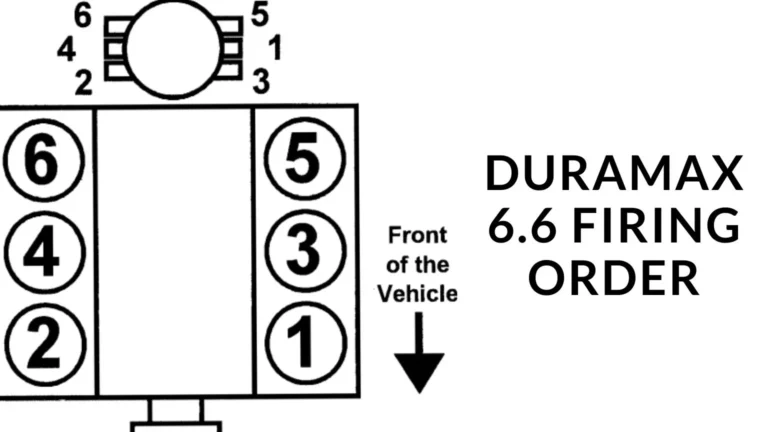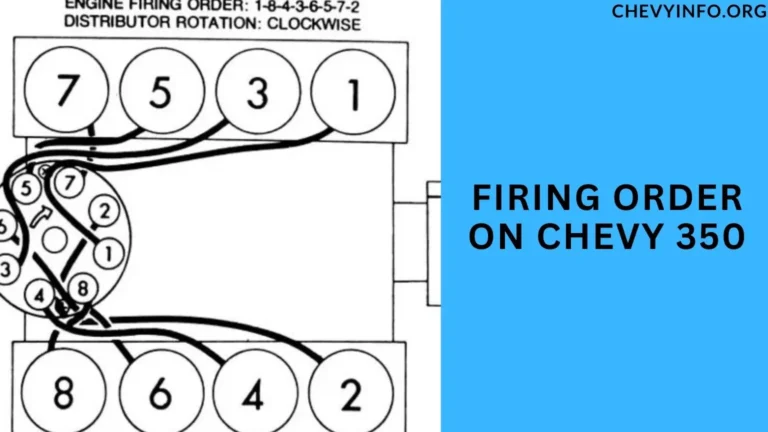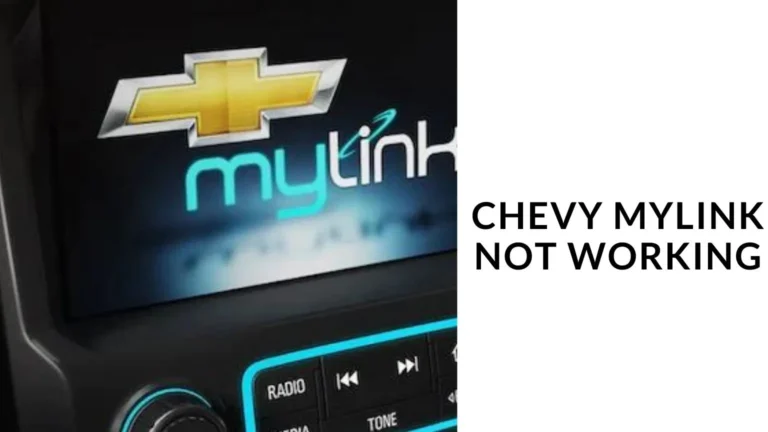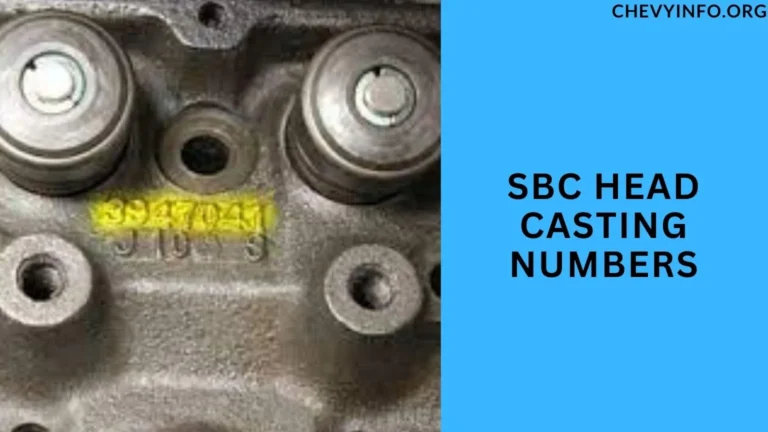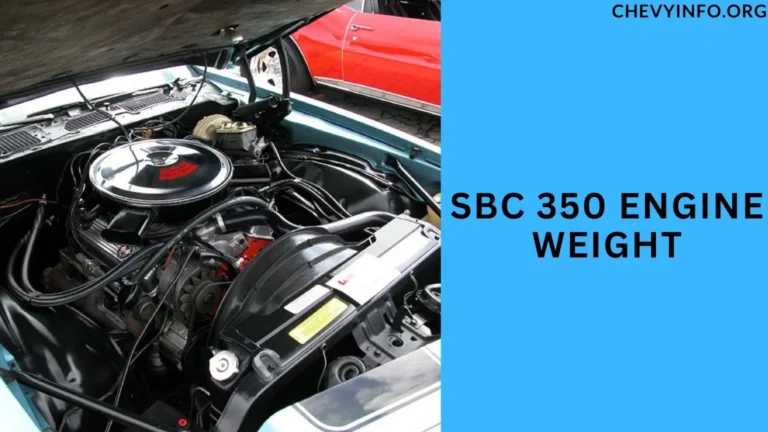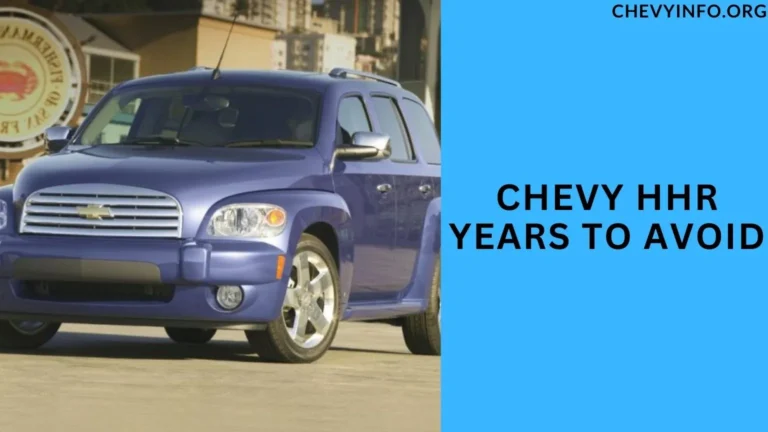Chevy Check Engine Light Flashing Then Stops
The check engine light in a Chevy vehicle is an essential indicator designed to alert drivers about potential issues within the engine or emission system.
Chevy Check Engine Light Flashing Then Stops, When this light starts flashing and then stops, it can indicate various underlying problems that require prompt attention.
In this article, we’ll delve into the causes of a flashing check engine light in Chevy cars, how to diagnose these issues, preventive maintenance tips, and more.
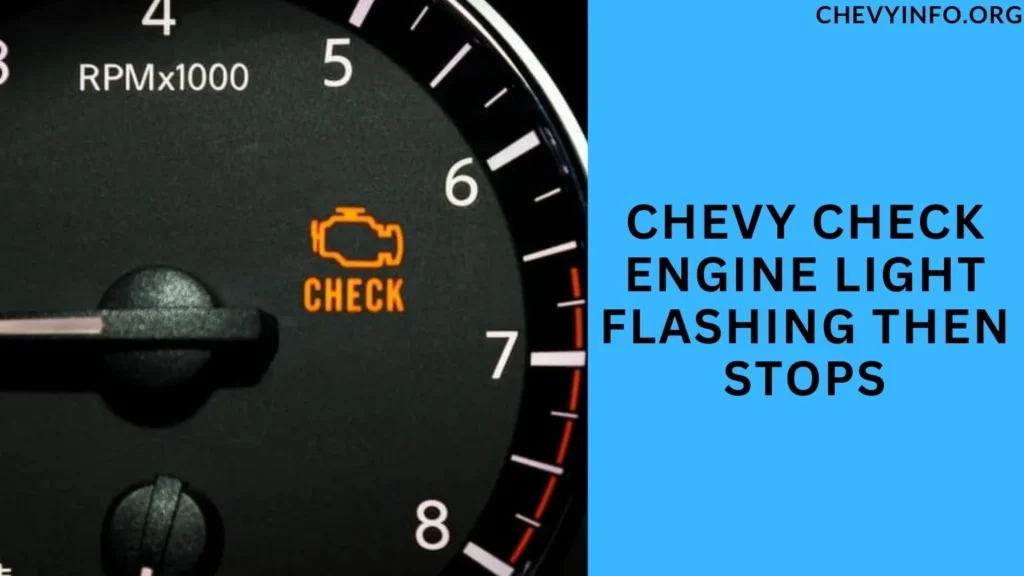
Introduction to Chevy Check Engine Light
Modern Chevy vehicles are equipped with sophisticated onboard diagnostic systems that monitor the performance of various engine and emission components.
The check engine light serves as a warning signal, illuminating the dashboard when the system detects abnormalities or malfunctions.
Understanding the Chevy Check Engine Light Flashing Then Stops
The check engine light (CEL) in modern vehicles, including Chevy models, serves as a crucial indicator of potential issues within the engine or emission system.
When this light illuminates the dashboard, drivers need to understand its significance and take appropriate action.
we’ll delve into what triggers the check engine light, its importance, and how to interpret and address issues related to it.
What Triggers the Check Engine Light?
The check engine light can be triggered by a range of issues, including faulty sensors, engine misfires, exhaust system problems, and more. Ignoring this warning light can lead to more severe damage and costly repairs down the line.
Importance of Addressing Check Engine Light Issues
Promptly addressing check engine light issues is crucial to maintaining the overall health and performance of your Chevy vehicle.
Ignoring these warnings can result in decreased fuel efficiency, engine damage, and potential safety hazards.
Common Reasons for a Flashing Check Engine Light in Chevy Vehicles
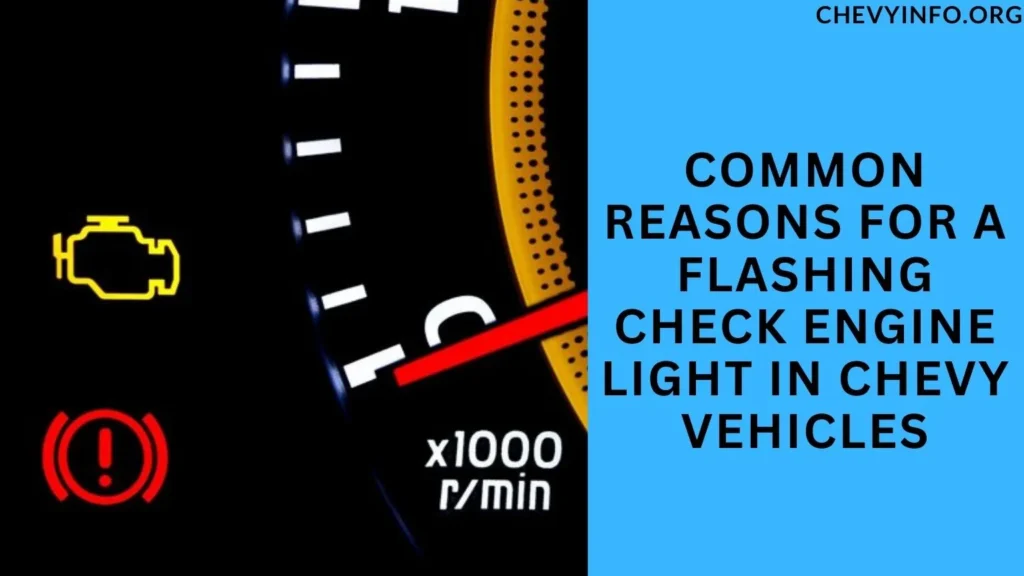
Here are some common reasons for a flashing check engine light in Chevy vehicles:
1. Spark Plug Issues
Worn-out or faulty spark plugs can cause the check engine light to flash intermittently. This issue often leads to engine misfires, rough idling, and reduced fuel efficiency.
2. Fuel System Problems
Issues within the fuel system, such as a clogged fuel injector or fuel pump malfunction, can trigger the check engine light to flash. Proper diagnosis and repair are necessary to restore optimal fuel delivery and engine performance.
3. Catalytic Converter Concerns
A failing catalytic converter can trigger the check engine light and may cause the vehicle to fail emissions tests.
Addressing catalytic converter issues promptly is essential for maintaining environmental compliance and engine efficiency.
4. Oxygen Sensor Malfunction
Faulty oxygen sensors can lead to a flashing check engine light in Chevy vehicles. These sensors play a crucial role in monitoring and adjusting the air-fuel mixture, and their malfunction can affect engine performance and emissions.
5. Ignition System Problems
Issues within the ignition system, such as a malfunctioning ignition coil or distributor, can cause the check engine light to flash. Ignition system problems can lead to engine misfires, reduced power, and poor fuel economy.
6. Emission Control System Malfunction
Issues with components related to emission control, such as the EGR valve or EVAP system, can trigger the check engine light.
These problems can affect the vehicle’s emissions performance and may lead to regulatory compliance issues.
7. Loose or Faulty Gas Cap
A loose or faulty gas cap can cause the check engine light to illuminate. This is a relatively minor issue but should still be addressed promptly to prevent fuel evaporation and maintain proper fuel system operation.
8. Transmission Issues
Malfunctions in the transmission system, such as slipping gears or fluid leaks, can sometimes trigger the check engine light.
Prompt diagnosis and repair of transmission problems are essential to avoid further damage to the vehicle.
9. Engine Sensor Malfunction
Various sensors in the engine, such as the mass airflow sensor (MAF) or throttle position sensor (TPS), can malfunction and trigger the check engine light.
Proper diagnosis and replacement of faulty sensors are necessary for optimal engine performance.
10. Electronic Control Module (ECM) Issues
Problems with the electronic control module, which manages the vehicle’s engine and emission systems, can lead to a flashing check engine light. ECM issues require professional diagnosis and repair to ensure proper vehicle operation.
Diagnosing and Resolving Check Engine Light Issues
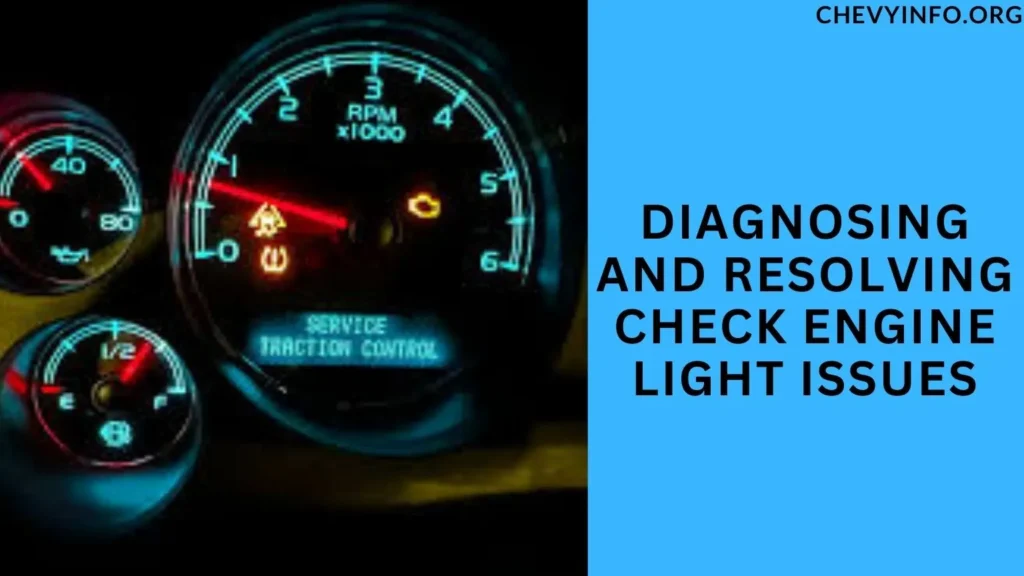
When the check engine light (CEL) illuminates your Chevy vehicle, it’s crucial to diagnose and resolve the underlying issues promptly to prevent further damage and ensure optimal performance.
Here are steps to effectively diagnose and resolve check engine light issues:
Using an OBD-II Scanner
Utilizing an OBD-II scanner allows for the retrieval of diagnostic trouble codes (DTCs) associated with the check engine light.
These codes provide valuable insights into the specific issue affecting your vehicle, aiding in accurate diagnosis and repair.
Seeking Professional Help
For complex or persistent check engine light issues, consulting a qualified mechanic or dealership service center is recommended. Trained technicians have the expertise and diagnostic tools to identify and resolve underlying problems effectively.
Preventive Maintenance Tips for Avoiding Check Engine Light Problems
To avoid check engine light (CEL) issues and ensure your Chevy vehicle runs smoothly, follow these preventive maintenance tips:
Regular Vehicle Inspections
Scheduling regular inspections and maintenance checks for your Chevy vehicle can help detect potential issues early on, preventing them from escalating into major problems that trigger the check engine light.
Timely Maintenance of Engine Components
Routine maintenance tasks such as oil changes, air filter replacements, and spark plug inspections contribute to optimal engine performance and reduce the likelihood of check engine light issues.
Driving Habits and Environment
- Gentle Driving: Avoid aggressive driving, excessive idling, and sudden acceleration. Smooth driving reduces wear on engine components.
- Warm-Up Period: Allow the engine to warm up before driving in cold weather. This prevents strain on engine components and improves fuel combustion.
- Avoid Overloading: Do not exceed the vehicle’s load capacity. Overloading can strain the engine and lead to performance issues.
- Garage Parking: Park the vehicle in a garage or covered area to protect it from extreme weather conditions and environmental damage.
Regular Professional Inspections
- Scheduled Maintenance: Follow the manufacturer’s recommended maintenance schedule for tune-ups, inspections, and fluid changes.
- Diagnostic Checks: Periodically perform diagnostic checks using an OBD-II scanner, even if the check engine light is not illuminated. Address any pending codes or emerging issues promptly.
- Professional Tune-Ups: Schedule regular tune-ups with a qualified mechanic to ensure all engine components are in optimal condition.
People also ask
What does it mean if your check engine light is blinking and then stops?
If your check engine light blinks and then stops, it typically indicates a severe engine misfire that requires immediate attention.
Continuing to drive with a flashing check engine light can lead to further damage to engine components and potential safety hazards.
It’s recommended to have the vehicle inspected by a qualified mechanic as soon as possible.
Why is the check engine light blinking on my Chevy?
A blinking check engine light on your Chevy often indicates a severe issue such as a misfire, which can lead to catalytic converter damage if not addressed promptly.
It’s crucial to have the vehicle diagnosed by a professional to determine the exact cause and prevent further damage.
Why would the check engine light come on and then go off?
The check engine light can come on and then go off due to temporary issues like a loose gas cap or a minor sensor glitch.
However, it’s essential to have the vehicle checked even if the light goes off, as there may still be underlying problems that need attention.
What does intermittently flashing of check engine light for no apparent reason mean?
Intermittently flashing the check engine light for no apparent reason typically indicates a potential electrical or sensor malfunction.
It’s crucial to have the vehicle inspected by a professional to diagnose and resolve the underlying issue to prevent further complications.
Conclusion
The flashing check engine light in a Chevy vehicle demands attention and timely action to prevent further complications.
By understanding the common reasons behind this warning, utilizing diagnostic tools, and prioritizing preventive maintenance, drivers can ensure their vehicles operate smoothly and efficiently.
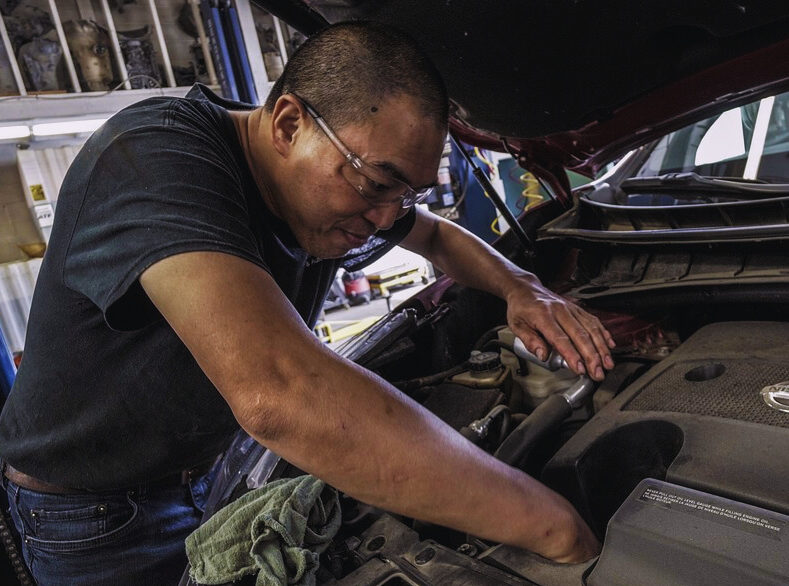
Henry Worner, a seasoned automotive expert with over 13 years of experience in car repair, maintenance, and performance enhancement, ChevyInfo.org was born out of a passion for Chevrolet vehicles. Henry’s deep-rooted love for everything Chevy has driven him to create a platform where fellow enthusiasts, car owners, and anyone interested in Chevy cars can find valuable insights, tips, and guidance.

